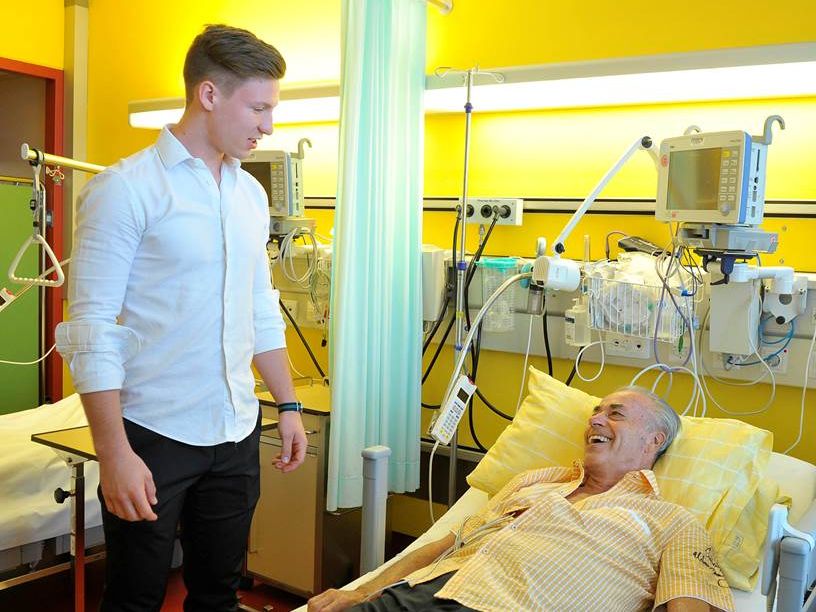
(Vienna, 12 August 2016) The prompt intervention of a bystander and the use of a publicly installed defibrillator (defib) saved the life of a man suffering cardiac arrest in the Vienna district of Neubau. The patient was treated by the Department of Emergency Medicine of MedUni Vienna and Vienna General Hospital and has now been moved to a normal ward.
Niklas Rast reacted quickly and appropriately when he saw the emergency occur in a travel agents in Vienna's Neubaugasse. A customer had suffered a cardiac arrest. "A member of staff had already dialled the emergency services on 144. I shouted to a man to fetch a defibrillator," said the man from Graz. At the same time the first responder started to perform cardiac massage. A few minutes later the helper came back with the defibrillator from the public-access Gewista defib station on Mariahilfer Straße 71A, 150 m away. Following the instructions given via the device's loudspeaker, the two first responders made all the preparations for administering the shock.
The Vienna emergency services team arrived a few moments later and took over the resuscitation process. In Vienna General Hospital, the patient went straight to the Department of Emergency Medicine but was then transferred to a normal ward after only a few days. Today, nine days after the incident, Günter Bodner, who had been moments from death, received a visit from the young man who had saved his life due to his rapid intervention and exemplary action.
Harry Kopietz, Chairman of the charity PULS, dedicated to combating sudden cardiac death, rewarded the young man's exemplary conduct with a Lifesaver certificate. “Mr Palt demonstrated moral courage and exemplary conduct!" Kopietz pointed out that it is important and makes good sense to install publicly accessed defibrillators: "Cardiac arrest can happen to anyone, anytime, anywhere. The more defibrillators there are and the more lay people that are able to operate them, the more people will survive sudden cardiac arrest in the future."
The only thing you can do wrong is NOTHING
Every 45 minutes, someone in Austria dies of sudden cardiac death. The probability of survival for a lifeless patient decreases by approximately 10% per minute. And so, very often the only thing that saves a person's life is rapid action by lay people, before the emergency services arrive. But very few people trust themselves to intervene. When questioned, people gave the main reasons for not helping as being fear of failing and lack of knowledge. So, in an emergency situation: the only thing you can do wrong is NOTHING!
"Just by a few hand movements – by applying firm pressure in the centre of the rib cage and quickly deploying a defibrillator, even before the emergency services arrive, bystanders who witness a cardiac arrest can provide effective help and thus increase people's chances of survival from the current 11% to more than 70% ," explains Mario Krammel, critical care doctor at MedUni Vienna and Vienna General Hospital and Executive Chairman of PULS.
The campaign to install defibrillators in public areas is being scientifically monitored by MedUni Vienna. Four different departments are involved in this: the Department of Anesthesia, Critical Care and Pain Medicine, the Department of Emergency Medicine, the Department of Medicine II (Cardiology) and the Department of Trauma Surgery.
In collaboration with the City of Vienna and PULS charity, Gewista has already installed glass cabinets with defibrillators for public use at ten locations in Vienna. These can be removed in an emergency – like a fire extinguisher. A telephone connection is automatically established with the emergency control room of Vienna Emergency Services. The lay defibrillator in the Gewista stations gives verbal instructions to talk first responders through the emergency procedure. In this way, even a complete medical novice can become a life-saver.
Apart from these, there are currently a total of 800 public-access defibrillators available throughout Vienna.